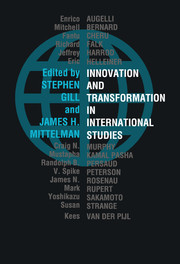Book contents
- Frontmatter
- Contents
- List of contributors
- Preface
- Acknowledgements
- Part I Rethinking and remaking the roots of global social and political theory
- Part II Political economy: the social and ecological anatomy of transformation
- Part III Transformation, innovation and emancipation in global political and civil society
- Part IV Reflections on global order in the twenty-first century
- References
- Index of names
- Index of subjects
Part IV - Reflections on global order in the twenty-first century
Published online by Cambridge University Press: 05 July 2011
- Frontmatter
- Contents
- List of contributors
- Preface
- Acknowledgements
- Part I Rethinking and remaking the roots of global social and political theory
- Part II Political economy: the social and ecological anatomy of transformation
- Part III Transformation, innovation and emancipation in global political and civil society
- Part IV Reflections on global order in the twenty-first century
- References
- Index of names
- Index of subjects
Summary
Part IV discusses the overall condition of and potential for global order(s) on the eve of the twenty-first century. The authors offer quite varied perspectives. At this stage in the present transformation, no single viewpoint on the emerging world order could be sufficiently prescient. We appear to be at a cross-roads but cannot rely on the old, taken-for-granted pathways. What seems important for the development of theory is to explore the many paths available in an open, pioneering spirit of theoretical innovation.
The first chapter by Yoshikazu Sakamoto links Parts III and IV. It considers potentials for the globalisation of democracy through agencies associated with new concepts of civil society. In addition, the chapter situates the ‘transformative dynamics of the modern world’ since the eighteenth century, as involving a set of fundamental contradictions: (i) capitalism vs. socialism; (ii) democracy vs. authoritarianism; and (iii) nationalism vs. internationalism. Sakamoto notes that socialism and authoritarianism have receded in importance, whereas capitalism, democracy and nationalism have gained currency. In this context, James Rosenau examines mentalities associated with the multiple forms of the ‘ordering’ of the world, understood as overlapping and intersecting in patterns of integration and fragmentation: or ‘fragmegration’. Susan Strange argues that large-scale global interstate war and the conflict between capitalism and socialism are of the past. Thus we need to pose new problems (Ps) and questions (Qs) to understand world order.
- Type
- Chapter
- Information
- Innovation and Transformation in International Studies , pp. 203 - 206Publisher: Cambridge University PressPrint publication year: 1997



